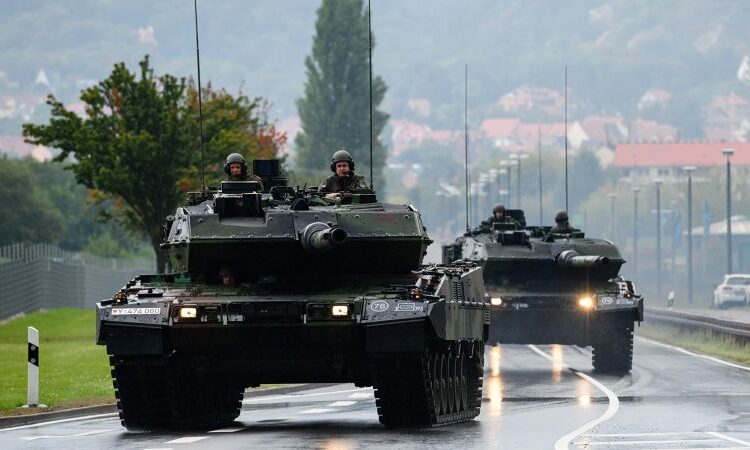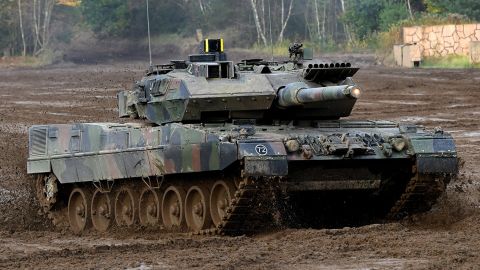
CNN
—
The past 12 months has forced European leaders to seriously rethink their approach to national security.
If Russia’s invasion of Ukraine has confirmed one thing, it’s that peace on the continent cannot be taken for granted. The status quo – decades of low spending and defense not being a policy priority – cannot continue.
This is especially true in Germany, which has for years has spent far less on its military than many of its Western allies but is now reconsidering its approach to defense at home and abroad.
Days after the invasion began last February, German Chancellor Olaf Scholz delivered a head-turning speech to parliament in which he committed to spending €100 billion ($108 billion) to modernize Germany’s military capacity.
He also vowed that Germany would lift its defense spending to 2% of GDP – meeting a target set by NATO that it had missed for years – and end its deep reliance on Russian energy, particularly gas.
However, nearly a year on, critics say Scholz’s vision has failed to become reality. And Germany has been accused of dragging its feet when it comes to sending its more powerful weapons to Ukraine.
The criticism has grown in recent days as US and European leaders have piled pressure on Berlin to send German-made Leopard 2 tanks to Ukraine, or at least allow other countries to do so.
Experts estimate there are around 2,000 Leopard tanks in use by 13 countries across Europe, and they are increasingly being seen as vital to Ukraine’s war effort as the conflict grinds into a second year. But Berlin must grant these nations approval to re-export German-made tanks to Ukraine, and it has so far resisted calls to do so.
Scholz has insisted that any such plan would need to be fully coordinated with the whole of the Western alliance, and German officials have indicated they won’t approve the transfer of Leopards unless the US also agrees to send some of its tanks to Kyiv.
On Friday, a key meeting of Western allies in Germany broke up without a wider agreement on sending tanks to Ukraine, after the country’s new defense minister Boris Pistorius said no decision had yet been made by his government.
Pistorius rebuffed claims that Germany has been “standing in the way” of a “united coalition” of countries in favor of the plan. “There are good reasons for the delivery and there are good reasons against it … all the pros and cons have to be weighed very carefully, and that assessment is explicitly shared by many allies,” he added.
Germany’s decision to dig in on sending tanks will likely go down badly with its allies, both in the immediate and long-term.
“It’s like acid eroding through layer after layer of trust,” a senior NATO diplomat told CNN on Friday. The diplomat added that Germany’s hesitance could also have a lasting impact on the rest of Europe and potentially push other members of the alliance closer towards the US, even if Germany is reluctant to do so.
And the divisions in the alliance have only grown more public in recent days – earlier in the week, Poland’s prime minister described Germany as “the least proactive country out of the group, to put it mildly,” and suggested his country might send Leopards to Ukraine without Berlin’s approval.

For all of the criticism of Germany’s hesitance on tanks, Berlin has played a crucial role in supporting Ukraine over the past year. The US and the UK are the only two countries to have delivered more military aid to Kyiv than Germany since the invasion began, according to the Kiel Institute.
Germany’s military support for Ukraine has evolved over time. It ditched its longstanding policy of not delivering lethal weapons to conflict zones and recently has stepped up deliveries of heavier equipment to Ukraine, including armored infantry fighting vehicles and Patriot missile defense systems.
The government, however, sees tanks as a massive step up from the weaponry it’s delivered to Ukraine so far, and fears that authorizing German tanks to be used against Russia would be seen by Moscow as a significant escalation.
Experts say the reticence is partly borne of Berlin’s pragmatic approach to conflict in general, and a relatively timid military posture going back decades, informed by what Scholz himself has described as “the dramatic consequences of two world wars that originated in Germany.”
“Germany has been on a peace-time footing for years. We don’t have the expertise in procedure or procurement to do anything at speed right now. The truth is that for decades, we have seen our defense budget as a gift to our allies because they thought it was important,” said Christian Mölling, deputy director at the German Council on Foreign Relations.
Whatever happens in Ukraine, Germany will have to ask itself some big questions about security in the coming years. The appetite to improve Germany’s armed forces has grown significantly since the start of the war.
Last week, Christine Lambrecht resigned as defense minister amid criticism of her efforts to modernize the military. Lambrecht had struggled to do anything of note with the €100bn that Scholz made available to her last year. The head of the Christian Democrats, the main opposition party in Germany, has accused the Chancellor of not taking his own speech last year seriously.
The person who now gets to spend that money is Pistorius, who German officials see as a safe pair of hands and up to the job. The question that he and Scholz must answer is how far Germany is willing to go in being a serious military presence in Europe.
In December, Germany admitted that it would not meet Scholz’s pledge to meet the NATO requirement on defense spending in 2022, and said it would likely miss the target again in 2023.
And its military’s combat readiness is inferior to that of some other European powers. According to the Rand cooperation, it would take Germany roughly a month to mobilise a fully-armored brigade, whereas the British army “should be able to sustain at least one armored brigade indefinitely.”
Defense experts say Germany will find it hard to move very far or very fast in its efforts to bolster its military.
“Yes, we have committed to spending more on our security, but without any clear idea of exactly what it should be spent on or how it fits into a broader security strategy,” Mölling said.
Mölling also believes that German’s defense ambitions could be hamstrung by political will: “Careers have been built on the narrative that Germany is a peace-loving nation. The public mood is shifting and possibly at a tipping point, but it would be very hard to be the leader that drove to make Germany a leading player in European security.”
European officials and diplomats are pessimistic and think that the reality of German politics means it will ultimately continue resisting serious reform on defense.
It is often said in diplomatic circles that Germany’s 21st century model for success has been built on three pillars: cheap Chinese labor, cheap Russian energy, and American guarantees of security.
Many believe this well-known preference for diplomatic pragmatism and subsequent reluctance to pick sides will mean any defense reforms will be severely limited.
One German official told CNN that it will be hard for mainstream politicians to break free from old habits: “They have an inherent skepticism against siding overtly with the USA and a subtle hope that the relationship with Russia can be fixed.”
Berlin has also lent its support to Ukraine in other ways, taking action to wean itself off of Russian gas and setting an example for rest of Europe, which has seen its overall consumption of gas go down since the the start of the war. Europe’s relatively warm winter has of course helped, but stopping Putin from weaponizing energy has been an important factor in the Western pushback on Moscow.
But the security map of Europe has been redrawn, as have the dividing lines in the international diplomacy. Russia’s unprovoked invasion of another country has demonstrated more clearly than ever that moral values are not universal.
Germany, Europe’s wealthiest country, has undeniably benefited enormously from its policy of keeping feet in two camps. It is protected by NATO membership while maintaining economic relations with undesirable partners.
That policy has been called out and Germany must now decide exactly what kind of voice it wants to have in the current conversation taking place about global security. The decisions it takes in the next few years could play a crucial role defining the security of the entire European continent for decades to come.






